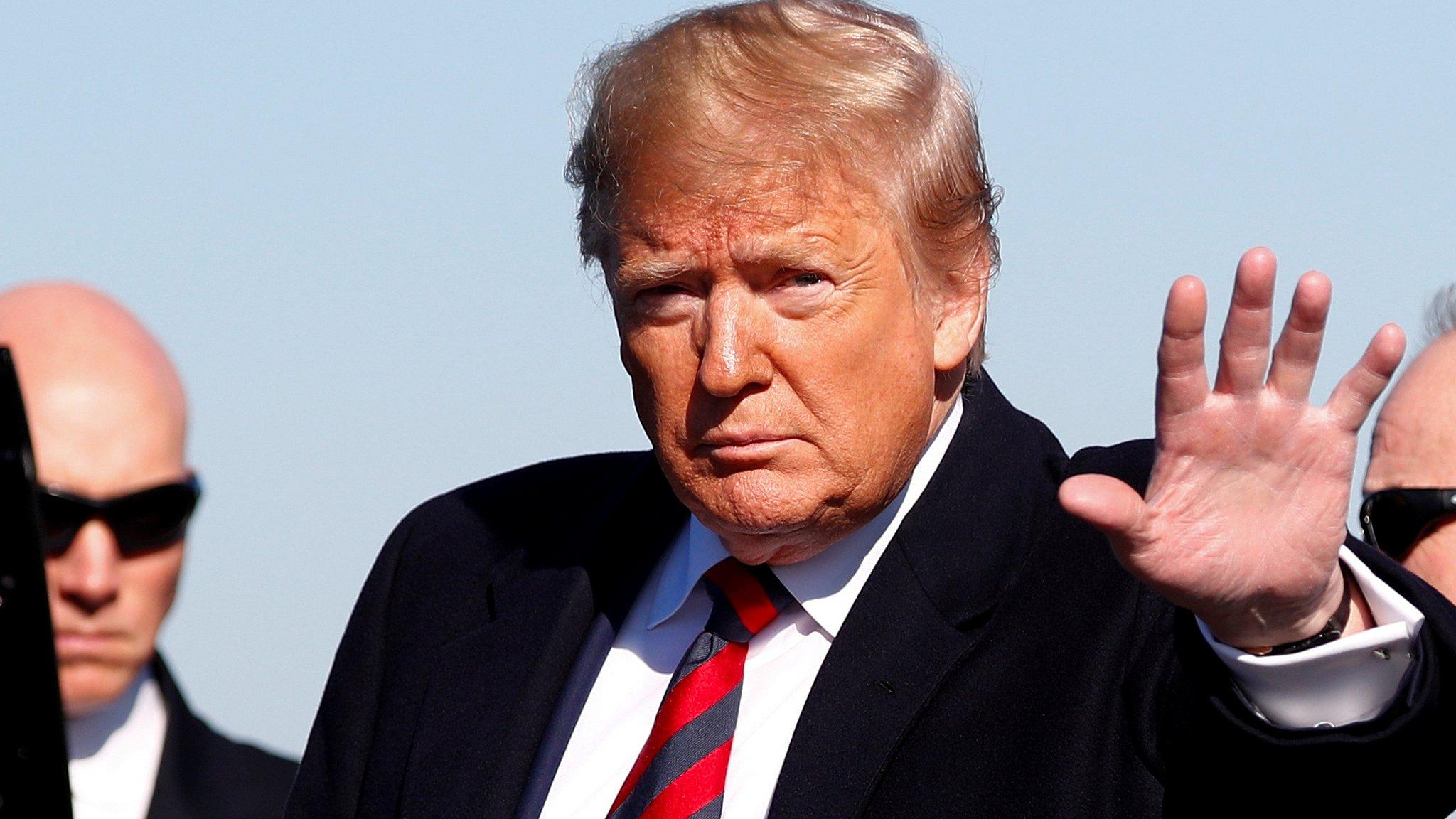Trump, Ukraine and impeachment: Your questions answered
- Published
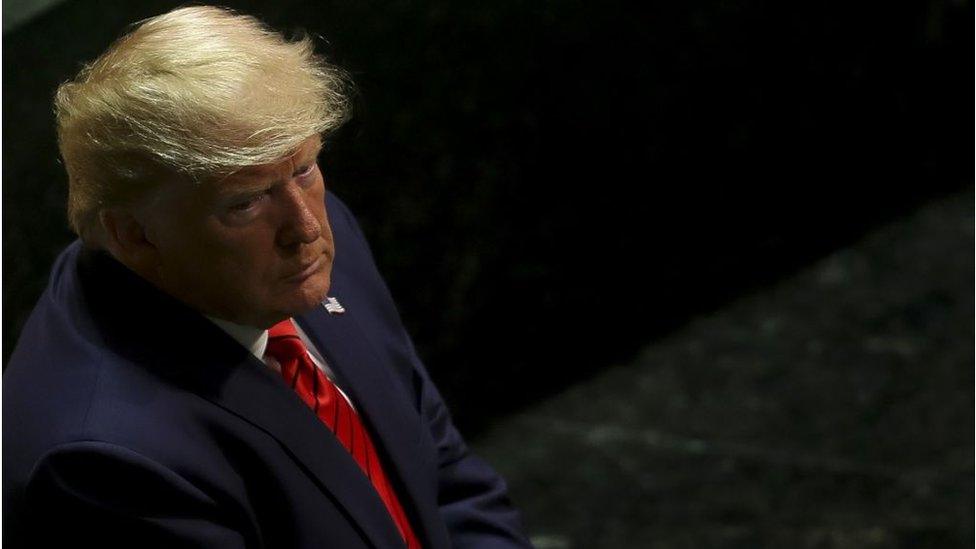
US Democrats have opened a formal impeachment inquiry into President Donald Trump in the wake of new revelations about the president's contacts with Ukraine from an internal whistleblower.
We've answered a sample of your questions on the situation, and added two of our own (marked *).
Will the impeachment be solely on this issue or is it likely to be a portfolio of 'crimes'?
Six House committees are currently investigating the president and gathering evidence related to any impeachable offences.
The Judiciary Committee will eventually decide which - and how many - articles of impeachment votes they will pose to the entire House.
But Speaker of the House of Representatives Nancy Pelosi and other top Democrats have reportedly agreed to keep the focus on the Ukraine allegations.
Can the House impeach but it then not proceed to the Senate?
In a word, unlikely.
Removing a US president from office is a two-stage process. The House begins impeachment proceedings - in effect, laying out the charges - but the Senate holds the trial.
When the House votes on articles of impeachment, anything less than a simple majority means it fails.
What does it take to impeach a president?
If there is a majority, the president is impeached and then the process moves to the Senate for a trial, where a select group of House members present the case for removal, the president's lawyers offer their defence and senators sit as a de facto jury.
It would take two-thirds of the Senate voting to convict Trump for him to be removed from office.
In theory, Senate Majority Leader Mitch McConnell could play hardball and refuse to schedule the vote or delay it, in the same way he sat on the Supreme Court vacancy for nearly a year until after the 2016 election.
The relevant passage in the US constitution states that the Senate "shall have the sole Power to try all Impeachments". It says nothing about timelines or even that a trial is mandatory. That could give Mr McConnell, who has shown a willingness to make controversial decisions to achieve political ends, some wiggle room.
But on Friday, Mr McConnell said he would not stand in the way of a trial.
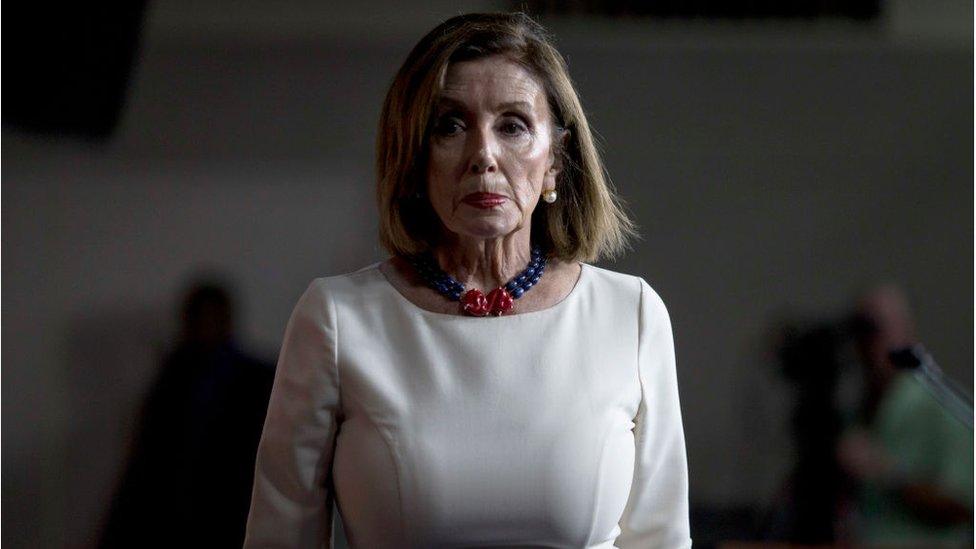
Speaker Nancy Pelosi has reportedly called for the impeachment inquiry to focus on Ukraine

Impeachment is unlikely. What do House Democrats have to gain in this situation?

There was a considerable amount of internal debate among Democrats prior to this week over whether impeachment would be a winning issue for them politically. Some, including Speaker of the House Nancy Pelosi, worried that an impeachment drive would rally the Republican base and frustrate moderates who want Congress to focus on policy issues.
Impeachment proponents countered that the purpose of a formal impeachment inquiry is to shift public opinion - and that while the public may not be on board now, they could be convinced once the evidence is gathered and presented in a compelling way.
What's more, there are many Democrats who view impeachment as a moral duty. In their view, the president has broken the law and violated his presidential oath. To not make an attempt to remove him from office would be giving tacit approval to his actions and encourage even more transgressions.

Can Trump face legal action and jail time if the allegations are proven?
Any fines or jail time "for crimes committed while in office are left to civil courts", according to the House of Representatives.
So the answer is yes, he could, but an impeachment conviction from Congress does not mean a conviction in the criminal sense.
The president still has several other legal troubles relating to his presidency, family and businesses making their way through the courts.
If Trump is removed, but Pence is also implicated, what happens then?
The line of succession for the US government - as established by the Presidential Succession Act of 1947 - if the president and vice-president are removed is:
Speaker of the House (Nancy Pelosi)
President Pro Tempore, the second-highest ranking official in the Senate (Chuck Grassley)
Secretary of State (Mike Pompeo)
Secretary of the Treasury (Steve Mnuchin)
Is what Trump did with Ukraine any different from what Democrats did there? *

During his UN press conference on Wednesday, Donald Trump alleged that Chris Murphy and other Senate Democrats who had contact with Ukrainian officials were the ones who were engaging in nefarious acts.
The president said that a 2018 letter from Senators Robert Menendez, Richard Durbin and Patrick Leahy and a September 2019 visit by Mr Murphy all included threats to cut off aid to the nation and demands that the Ukrainian government not co-operate with the Trump administration.
That 2018 letter to then-prosecutor Yuriy Lutsenko expressed "concern" that the Ukrainian government was no longer co-operating with Robert Mueller's Russia meddling inquiry and backing off its own investigation into former Trump campaign chair Paul Manafort, who had significant dealings with the nation. The senators asked for more information, but the letter did not threaten the termination of US aid.
Mr Murphy says during his recent visit to Ukraine he told Mr Zelensky that he should not "take orders from Trump's campaign" or interfere in the 2020 election - and that the Ukrainian president expressed discomfort with the requests he was receiving from the Trump administration.
Is that different from what Mr Trump did? Only Mr Trump's requests for a "favour" were accompanied by action - the suspension of US aid.
What exactly did Biden and his son do?
Mr Trump and his lawyer Rudy Giuliani have accused Joe Biden of trying to force out Ukrainian prosecutor Viktor Shokin in 2016, while Joe Biden was US vice-president.
Mr Shokin was looking into a Ukrainian gas company where Biden's son, Hunter, was a board member.
What we know about Biden-Ukraine corruption claims
The president alleged Mr Biden withheld US aid to Ukraine to protect his son and the company, Burisma.
But no evidence has come to light showing Biden acted corruptly or was influenced by his son's work in Ukraine.
Biden was also not the only public official in the US or European Union who wanted Mr Shokin ousted.
However, critics believe at the very least the Biden family's ties to Ukraine raise the perception of a possible conflict of interest.
How many phone conversations were there?
The 30-minute call on 25 July was the first publicly acknowledged call between the US and Ukrainian leaders following a 21 April congratulatory call when Zelensky won the presidency.
Who gets to listen to the president's phone calls to know what was said?
US media report that several officials at the White House are usually present to listen into presidential calls.
These individuals may not be physically in the room with the president, but they are listening in and taking notes.
The White House chief of staff, defence and state department staff and national security council members are among those who may be listening in to any calls with foreign leaders.
There are also nonpartisan career staff with national security experience present to monitor the Situation Room.
In this case, the whistleblower's complaint noted that there were "approximately a dozen White House officials who listened to the call - a mixture of policy officials and duty officers in the White House Situation Room, as is customary", though it is unclear whether anyone was actually in the room with Mr Trump.
Can the White House withhold such transcripts?
Executive privilege - a power not explicitly named in the Constitution but supported by the Supreme Court - allows the president to keep information from the public, courts, and Congress when it comes to national security or diplomacy.
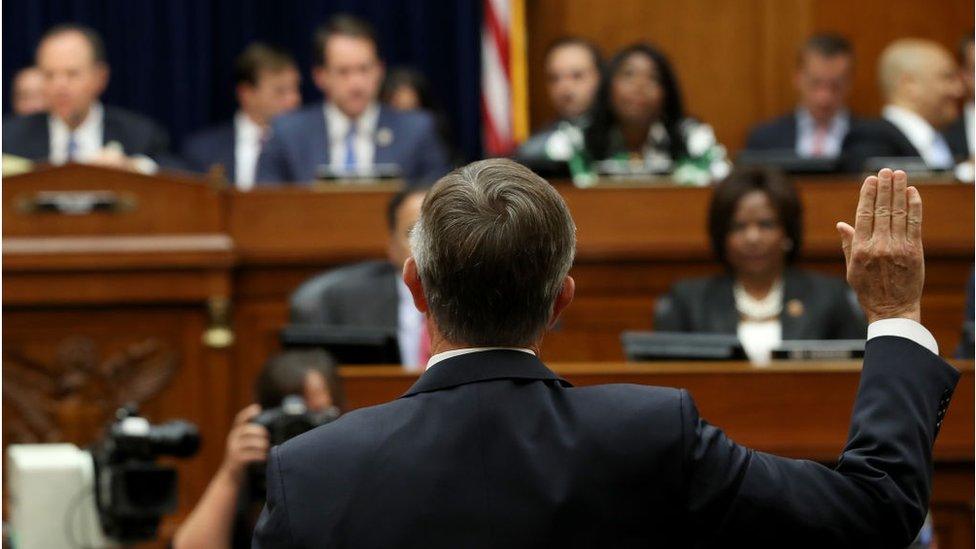
Acting Director of National Intelligence Joseph Maguire is sworn in prior to testifying about the whistleblower's complaint
When it comes to the Ukraine transcript, the whistleblower's complaint states it was placed into a National Security Council computer system typically used only for sensitive intelligence information - which some officials were concerned might be an abuse of the system.
It was also apparently "not the first time" this administration had done this with a president's transcript, the complaint states, "for the purpose of protecting politically sensitive - rather than national security sensitive - information".
Did the White House try to cover up details of Trump's Zelensky call? *

One of the new revelations in whistleblower complaint were allegations that, after Mr Trump's conversation with Mr Zelensky, the White House took steps to conceal - "lock down" - the records of the phone call.
This included removing the rough transcript from the computer system where such information is usually kept and place it in a different, more closely controlled location.
Democrats also point to the administration's reluctance to turn over the whistleblower complaint itself to Congress as evidence that Trump officials knew they were dealing with politically damaging, possibly criminal, material.
The Trump administration has had to contend with embarrassing leaks about the president's communications with foreign leaders since its earliest days, so any move for greater security of call readouts could also be a reflection of the administration's fear of unauthorised disclosure and not a unique action in just this case.
'Trump didn't do anything wrong' - US citizens react
Have other world leaders been removed after similar scandals?
They have - and here are a few examples.
Ukraine
With Ukraine playing a key role in this story, it's worth mentioning that Viktor Yanukovych, the former President of Ukraine between 2010 and 2014, was deposed from office a second time as a result of the Maidan revolution. He has that rare distinction of having been ousted twice from the presidency.
South Korea
Park Geun-Hye was the President of South Korea until she was forced out of office in March 2017. Ms Park was removed after a court upheld the South Korean parliament's decision to impeach her over her role in a corruption scandal involving a close friend.
Park was convicted in 2018 of bribery and abuse of power and given a 25-year jail sentence.
Brazil
In 2016, the Brazilian senate impeached President Dilma Rousseff for illegally manipulating government accounts. She was accused of breaking fiscal laws. She was found guilty of moving funds between government budgets, which is illegal under Brazilian law.
Ms Rousseff, who was the first woman to be elected president of the country, denied having done anything illegal and said that moving money between budgets was common practice among her predecessors in office. She lost the impeachment battle but won a separate Senate vote that had sought to ban her from public office for eight years.
- Published24 September 2019
- Published25 September 2019
- Published5 February 2020
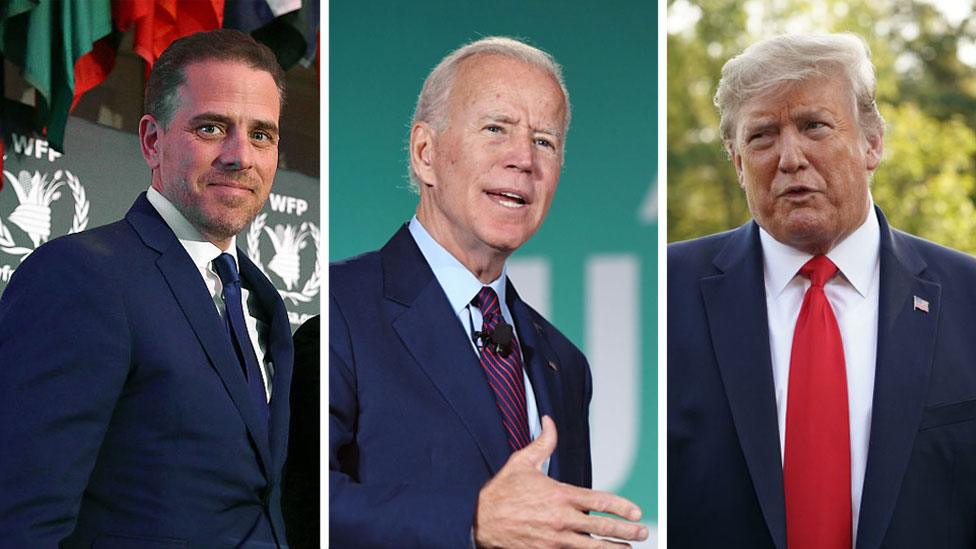
- Published19 December 2019
